The best 75-inch TVs 2024: big-screen bliss
The best 75-inch TVs offer a true big-screen experience
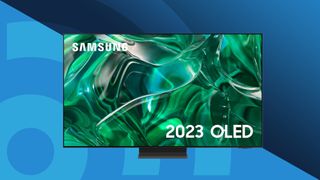
The list in brief ↴
1. Best for most people
2. Best Budget (US)
3. Best budget (UK)
4. Best mid-range
5. Best premium
6. Best for sound
7. Best for sport
8. Best for PS5 owners
9. How to choose
11. How we test
12. Latest updates
When it comes to getting a cinematic experience, the best 75-inch TVs can deliver something significantly closer to what you'd see at the cinema when stacked up against smaller models.
Having a TV of this size really has its advantages. Not only are details more noticeable thanks to the super-sized image, but you'll typically see brighter images with better contrast and richer colors, too.
In the past it's been prohibitively expensive to buy a 75-inch TV, because it was mostly only the very best TVs that came in these sizes. But that's not always the case these days – in fact, it's fairly easy to spot a good 75-inch TV deal every week that sees some behemoth television screen cut down in price to around what the best 65-inch TVs or best 55-inch TVs would cost.
Our guide has been designed to reflect a variety of prices, including some surprisingly affordable options as well as cutting-edge, ultra-premium home theater monsters, and we're constantly updating it as new models hit store shelves.
Let's get to the sets. Right below you'll find our guide to the best 75-inch 4K TVs you can buy in right now – including the best 8K TVs, because at this size that extra resolution really makes a difference. You'll also find many of the best OLED TVs here, though at 77 inches instead of specifically 75 inches. That's because OLED display panels are made slightly differently.

Al Griffin is TechRadar's Senior Editor for Home Entertainment in the US. Previously the editor of Sound & Vision magazine, he brings nearly three decades of tech journalism and AV product testing experience to the position. He's helped find the best 75-inch TVs available, from OLED magic to bang for your buck budget sets.
The quick list
Want to know what the best 75-inch TV for you is but are in a hurry? Check out the grid below with a quick list of each entry in this guide and why we've picked it. You can scroll down or follow the links below for a more detailed review of each TV.
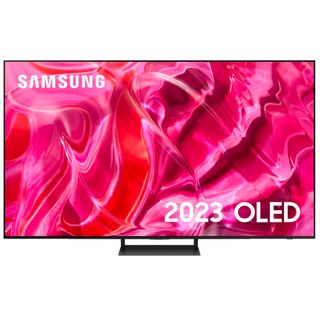
The best 75-inch for most people
QD-OLED quality picture for cheaper than before, plenty of gaming features and a sleek design make one excellent package that puts the Samsung S90C at the top of the pile for the 75-inch size range.
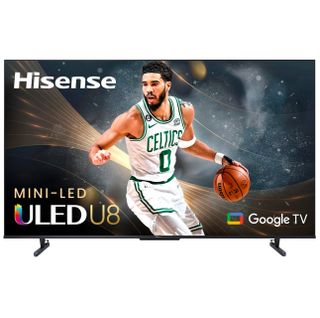
The best budget 75-inch TV in the US
The Hisense U8K has a mini-LED screen and plenty of gaming features all for a price that screams value for money. For those looking for a brighter, bigger screen.
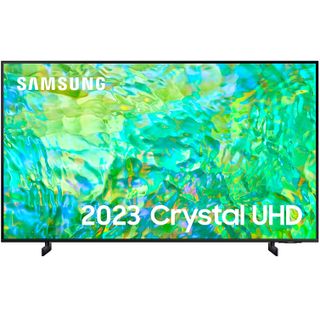
The best budget 75-inch TV in the UK
It doesn't have the best picture around, but the Samsung CU8000 does net you a big, colorful, feature packed TV on a budget.
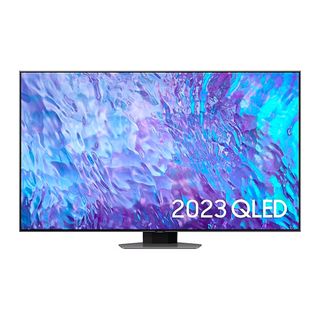
The best 75-inch mid-range TV
The Samsung Q80C is a well specced TV, with plenty of features for gaming, a bright QLED picture and good sound all for a competitive price
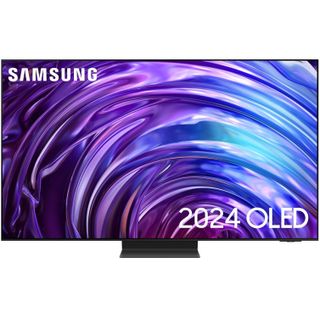
The best premium 75-inch TV
Although it comes with a price, the Samsung 77S95D feels every bit premium thanks to its outstanding picture, gaming prowess and all-around quality.
Load next products
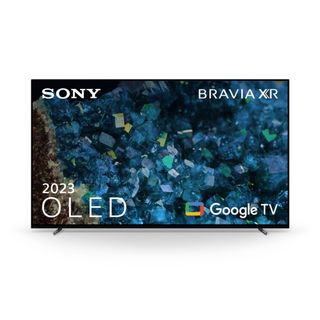
The best 75-inch TV for sound
With its ability to pass sound through the screen and its direct link between audio and what's happening on screen, the Sony A80L is ideal for those who want great built-in sound.
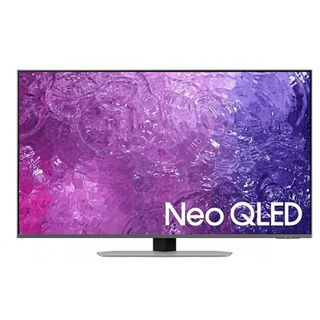
The best 75-inch TV for sports
Sports fan with a bright room? The Samsung QN90C may be the perfect TV for you, thanks to its superb motion handling, mini-LED panel and high full-screen brightness.
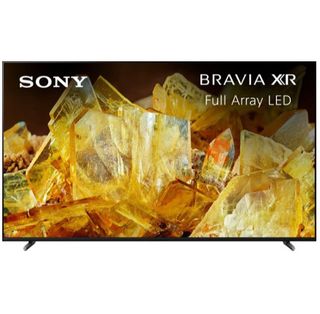
The best 75-inch TV for PS5 owners
The Sony X90L may only feature a regular LED backlight, but its picture is still nothing short of brilliant and its 'Perfect for Ps5' gaming features are a must for PS5 owners.
The best 75-inch TVs 2024
Why you can trust TechRadar
Below, you'll find more in-depth write-ups about each TV we've chosen for this list. We've tested and reviewed each one of these TVs and you can find links to their full reviews in each entry.
The best 75-inch TV for most people
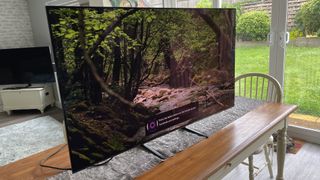
Specifications
Reasons to buy
Reasons to avoid
The Samsung S90C is our top pick for the best 77-inch TV overall. At a 77-inch screen size, any refinements introduced by picture processing will make a visible difference, and the S90C’s Neural Quantum 4K processor, the same one found in Samsung’s flagship S95C QD-OLED model, provides notably better upscaling for HD and standard-definition movies and TV shows, something it does using AI-based tech.
The second-gen QD-OLED display panel used in the S90C presents a notably brighter picture than what you get with regular OLED TVs, even ones priced around the same level as the S90C. Contrast is also strikingly good, and the picture retains uniform contrast and color even when viewed at far off-center seats. The S90C’s measured brightness is around 20% less than what you get from top-tier OLED TVs like the S95C or the LG G3, but it's nonetheless impressive when you take the mid-range S90C’s more reasonable price into consideration.
The S90C has an appealing design with a thin profile, although it swells out in the middle due to its internal connections box. Inputs include four HDMI 2.1 ports with support for 4K 120Hz signals and VRR for gaming, and like other Samsung TVs, it has a Gaming Hub feature for playing cloud-based games from services like Xbox and Nvidia GeForce Now.
One of the reasons why we rate the Samsung S90C so highly is its value. It’s only slightly more expensive than the LG C3 OLED, while delivering notably better brightness and even better built-in sound. You can get better brightness from the pricier Samsung S95C and LG G3, but, as we stated in our review, we can “actually see some home theater fans, especially those fond of watching films in darkened room settings, potentially preferring the slightly gentler, less explosively dynamic look of the S90C’s pictures,” compared to those premium models.
Read our full Samsung S90C review
The best budget 75-inch TV in the US
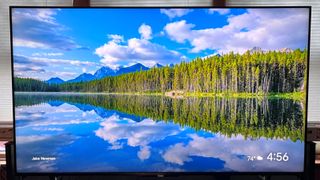
Specifications
Reasons to buy
Reasons to avoid
The Hisense U8K combines a great picture with excellent gaming features at a seriously competitive price point to make it a mid-range winner. Using mini-LED technology for high brightness levels, the Hisense U8K is a great option for daytime TV viewing and it uses Google TV as a smart TV platform, which is generally slick and packed with useful streaming apps.
Along with delivering the brightness benefit that mini-LED technology brings, the Hisense U8K also has deep black levels for an excellent contrast. Unfortunately, this contrast does fade to a degree when watching from off-center seats. But thanks to its anti-glare coating and a 1,590 nits peak brightness of (which tops any OLED TV available today) it’s a great big-screen TV for any viewing environment.
The Hisense U8K is a surprisingly well-stocked TV for gaming. Its dual HDMI 2.1 ports support an up to 144Hz refresh rate, along with Dolby Vision, VRR and ALLM. So unless you need four HDMI 2.1 ports to accommodate multiple consoles, the Hisense U8K is an ideal option for gaming. It also features a Game mode to get the lowest input latency for optimal gaming performance.
The Hisense has solid audio as well, with decent bass and dialog clarity. If you’d prefer to use a soundbar, its adjustable feet make it easy to accommodate one. The Hisense U8K may not be the perfect TV, but its overall performance is very good and its price will suit a lot of people's budgets.
Read our full Hisense U8K review
The best budget 75-inch TV in the UK
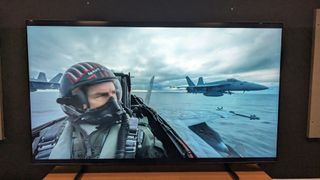
Specifications
Reasons to buy
Reasons to avoid
The Samsung CU8000 offers a bright colorful picture, with surprisingly good sharpness and a natural look. Its design is eye-catching and its gaming performance is good, despite lacking a lot of the premium gaming features of other TVs. If you're after a big screen at a budget price, the CU8000 is certainly an option.
First and foremost, the Samsung CU8000's picture is a mixed bag. Whilst it has impressively vivid colors and great detail, especially for a large LED TV, the CU8000 also has its pitfalls. As it's an edge-lit TV, black uniformity (the ability to evenly display black across the screen) is not good and black tones often take on a gray color and sometimes cloudy look. Its contrast is also lacking as a result of this. That's not to say the CU8000's picture is bad, but this is definitely something to be aware of. However, for the price at larger sizes, it's one of the better LEDs we've tested.
One of the CU8000's strongest points is its design. Despite being one of Samsung's more budget sets, it's great to see that care was taken in the design of the CU8000, which has a stunningly slim depth, trim bezel and solid build quality. That may not be one of the most important factors to some, but it's a very nice touch.
Whilst the Samsung CU8000 lacks a lot of gaming features we look for such as 120Hz support and VRR, graphically it was and crisp enough and handled motion well, thanks to a low 10ms input lag time. It certainly isn't one of the best gaming TVs on the planet, but it's adequate.
The Samsung CU8000 is a good enough option for those looking for a budget big screen, mainly thanks to its colorful picture and attractive design. Whilst its black levels aren't good and its gaming features are lacking, it provides what you need for a competitive price. If you can stretch your budget a bit more though, it might be worth it.
Read our full Samsung CU8000 review
The best mid-range 75-inch TV
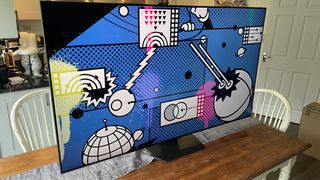
Specifications
Reasons to buy
Reasons to avoid
The Samsung Q80C offers a lot of quality for a competitive price, providing some of the best bang for your buck we've seen from a mid-range TV. With a bright, colorful and detail-rich picture, plenty of gaming features including 120Hz across four HDMI ports and great value, the Q80C is one of the best mid-range TVs available.
The Samsung Q80C uses a QLED panel, meaning it provides a brighter image than standard LED. But, we were surprised at just how bright the Q80C was for a mid-range TV, with peak brightness measured at 929 nits on the 65-inch model we tested. Combine this with vivid colors, excellent 4K detail and surprisingly deep black levels, and you have a real winner. It does suffer at off-angle viewing, but overall the Q80C's picture is phenomenal.
Gaming is another highpoint for the Q80C, with its extensive list of gaming features including 4K 120Hz support across all four HDMI ports, VRR and AMD FreeSync Premium support and a dedicated Game Hub with cloud gaming options. Overall, the Q80C is an excellent gaming TV for those with a mid-range budget.
Whilst it isn't the best performer in every category, the picture quality you get, the gaming features included, its above-average sound system and great value all combine to make a superb TV that impressed us.
Read our full Samsung Q80C review
The best premium 75-inch TV
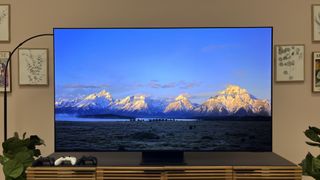
Specifications
Reasons to buy
Reasons to avoid
Similar to its predecessor, the Samsung S95C, the new Samsung S95D, takes OLED picture quality to the next level by combining an OLED display panel with QLED technology. But the S95D manages to be even brighter than the S95C, which previously reigned as the OLED TV brightness champ.
Samsung’s AI enhancements for the S95D bring unsurpassed detail levels to both 4K and lower-resolution pictures alike. Images are characterized by strong contrast and bold colors, and plenty of detail can be seen in dark, shadowy images. A new feature that arrives with the S95D is an anti-reflection screen that makes pictures look great even in bright room lighting, eliminating a long-standing issue with OLED TVs.
It’s not just movies that look great on the S95D, but Samsung also made it a powerhouse for gaming. It features 144Hz refresh rate, ALLM, VRR and AMD FreeSync Premium Pro support on all four HDMI 2.1 ports, and also has Samsung Gaming Hub for cloud-based gaming from services including Xbox, Nvidia GeForce Now, Luna, Utomik, and more.
Design-wise, the S95D is a beautiful-looking TV with a super-slim profile and bezel and a “floating” stand that makes the TV look airborne even when not wall-mounted. And if you do choose to wall-mount it, an external One Connect Box makes that type of installation elegant and easy.
Read our full Samsung S95D review
The best 75-inch TV for sound
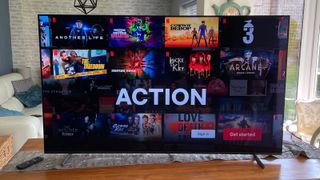
Specifications
Reasons to buy
Reasons to avoid
Sony’s A80L is the company’s mid-range OLED TV, and it’s a great option for anyone who wants to avoid using a soundbar in their setup. That’s because the A80L has the company’s Acoustic Surface Audio+ tech, which turns the entire screen into a speaker, and is augmented by two subwoofers for more full-range audio. This technology has the dual advantage of making sound effects and dialogue appear more accurately positioned than you’d normally hear with most TVs, and also with some soundbars.
Sony TVs are known for their high-quality picture processing, and the A80L’s Cognitive Processor XR manages to make even standard-definition streamed video look good. As you’d expect from an OLED TV, the A80L delivers notably deep blacks, but also with well-defined shadows and rich colors. Brightness is just average compared to premium OLEDs such as Sony’s own A95L, making the A80L a better option for viewing in a light-controlled space.
Sony has made recent improvements to the gaming features on its TVs, including a pop-up Game Menu that makes it easy to adjust game-related settings without having to escape to the TV’s setup menu. Beyond that, the A80L is “Perfect for PS5,” which means it can automatically tune HDR and switch between game genres when a PlayStation 5 console is connected. That’s great for PS5 owners, but if you want to plug in additional consoles, note that only two of its four HDMI ports support HDMI 2.1 features such as 4K 120 Hz and VRR.
Read our full Sony A80L review
The best 75-inch TV for sports
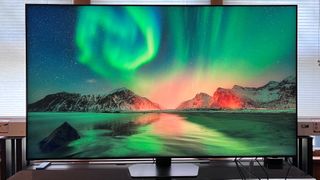
Specifications
Reasons to buy
Reasons to avoid
With its high brightness and anti-glare screen, the Samsung QN90C is an excellent 75-inch TV choice for daytime viewing, particularly if you’re watching sports. Samsung TVs also provide a sophisticated menu of motion processing options to fight motion blur, which will help images look crisp even when the onscreen action heats up.
Movies also look great on the QN90C due its powerful and precise local dimming, which delivers images with deep and detailed shadows. You don’t exactly get OLED-like blacks here, but it’s about as good as you can expect from a mini-LED TV.
The QN90C’s design is another high point. It’s wonderfully slim, with a thin bezel and hexagonal plate stand. Inputs include four HDMI ports with support for 4K 120Hz signals and VRR, making the QN90C a great option for gaming. Another gaming-related feature is Samsung’s Gaming Hub, which serves as a portal for gaming with cloud-based services including Xbox, Nvidia GeForce Now, Amazon Luna, and Utomik.
Samsung’s mini-LED TVs tend to be pricier than much of the competition, and that’s definitely the case here. But the QN90C’s bright image and powerful contrast, along with its appealing design and gaming features make it a standout option
Read our full Samsung QN90C review
The best 75-inch TV for PS5 owners
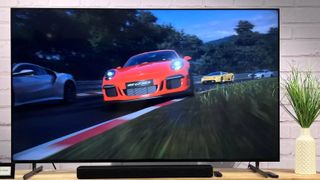
Specifications
Reasons to buy
Reasons to avoid
Sony’s X90L is an affordable mid-range model that incorporates tech found in the company’s higher end models, specifically the Cognitive Processor XR and the new Clear Image XR technology. Both these processing features boost performance with 4K HDR images, which look incredibly detailed on the Sony’s 75-inch screen, while improving upscaling performance for regular HD and standard-definition images.
The X90L series uses a regular LED backlight with local dimming, and its performance here is an improvement on 2022’s X90K series, with the new model showing deeper contrast and noticeably fewer backlight “blooming” artifacts.
Sound positioning tweeters located at the left and right sides of the X90L’s screen work to enhance imaging and the clarity of dialogue, which emanates naturally from screen-level. Adjustable-height support feet allow for a soundbar to be placed directly below the TV’s screen, and there’s also an option to have the screen sit flush with the stand.
The X90L is a great option for PlayStation 5 console owners, with auto HDR tone mapping and Auto Genre picture modes kicking in automatically when the TV is connected to a PS5. Sony’s new Game menu is also useful for making quick gaming adjustments.The only disappointment on the gaming front is that HDMI 2.1 features such as 4K 120Hz input and Variable Refresh Rate are only supported on two of the TV’s four HDMI ports.
The X90L has received numerous price cuts since launch, making it a very good value. It’s true that you can buy 75-inch TVs with a brighter mini-LED backlight such as the Hisense U8K also listed in this guide for around the same price, but the Sony’s refined picture processing and “Perfect for PlayStation 5” features make it a great option for movies and PS5 gaming.
Read the full Sony X90L 4K TV review
How to choose the best 75-inch TV
Is a 75-inch TV too big for a living room?
While many promotional and marketing images might lead you to believe that a 75-inch TV is too big for a living room, this really isn't the case for lounges of an average size.
So long as you have a table or stand that's accommodating to the TV's large size, and create adequate space for peripherals like soundbars and speakers, a 75-inch TV won't take up as much real estate as you might think. And if you're thinking of mounting a 75-inch TV on wall using one of the best TV wall mounts, you'll also want to consider how much space it'll take up on the wall.
Do keep in mind that you may have to rearrange the room around the TV for the best possible viewing experience, however.
How far should you sit from a 75-inch TV?
For optimal viewing with a 75-inch TV, we'd recommend sitting roughly 50-60 inches away from the screen for a fully immersive experience. Rearranging the furniture in your room to accommodate this will help, and it could be as simple as slightly adjusting your couch.
How much does a 75-inch TV cost?
The very best 75-inch TVs can vary wildly in price. The LG G3, for example, will run you an eye-watering $3,500 / £2,770 (around AU$5,400), while Hisense present a much more affordable option in the U8K at $1,300 (around £1,000 / AU$2,000).
The difference in price here seems drastic considering both examples offer excellent picture quality. It all depends on how much you're willing to pay for extra bells and whistles and design sensibilities, such as the G3's wonderfully thin design and best-in-class options for gaming.
Do be extra wary about TV sales that sound too good to be true, though. If you see a 75-inch 4K TV for around $600 / £600, it's probably going to let you down in terms of picture performance with bad backlighting and cheap edge-lit LED panels that produce poor black levels and contrast.
During key sales periods such as Black Friday, of course, those pricing expectations are a little different, so in any case it's worth paying attention to how much a 75-inch TV was at launch.
Some Hisense TVs can have a high launch price and quickly undercut it for a sense of value, and often you can get a good discount at least a few months after release, but in general you should be looking for the largest discount compared to a previous price, rather than just the cheapest 75-inch TV out there. And if you're low on cash, you should probably be opting for a decent 65-inch TV, rather than a half-baked 75-inch one.
Once you get to a 75-inch size, too, 8K TVs really become a smart investment too. That's because the greater number of pixels over 4K (33 million rather than eight million) ensures far greater detail at that size. A 55-inch 8K TV doesn't really make much of a difference, but a 75-inch 8K TV certainly does.
What 75-inch TVs are coming in 2024?
Many TV makers have announced models with a 75-77-inch screen size for 2024. Samsung will update its OLED lineup with the new S95D and S90D, both in a 77-inch screen size, and its QLED lineup will see new 75-inch QN90D mini-LED and Q80C regular LED offerings. A new QN900D 8K mini-LED model is also on its way that uses the company’s latest-gen Neural Quantum Processor 8K Pro and 240Hz VRR support for gaming.
LG will also update its OLED TV lineup for 2024 with new 77-inch G4, C4 and B4 models, all of which will see picture quality and usability enhancements.
On the budget mini-LED TV front, TCL will introduce new QM751G and QM851G models in a 75-inch screen size. Hisense and Sony will also have new mini-LED and QLED TVs, though both companies have yet to release details on specific models.
How we test the best 75-inch TVs
We test the TVs we selected for this best 75-inch guide not just on picture, but on every aspect including gaming performance, smart TV platform and menus, ease of use, built-in audio and even the overall physical design. We'll test out the features within the TV to make sure they're up to scratch and reflect this in our reviews.
75-inch is a big screen so you're often going to pay a premium for the very best, but we also look out for those TVs that give you value - performance without the price tag, so in this guide we've included TVs to suit every budget by testing across a wide range of prices.
We always strive to test these TVs with a variety of sources including Blu-ray, streaming, live TV, lower-resolution programs and movies and more so that we can fully test the TVs picture quality across the board, not just on the best possible picture.
Some of our reviewers will be testing with different equipment and in different conditions, but we will always aim to make this clear and to be as fair and as consistent as possible.
Latest updates to this 75-inch TV guide
May 6 2024
Replaced Samsung S95C with new Samsung S95D as 'best premium' option.
March 11 2024
Added info on new 75-77-inch TVs announced for 2024 to 'How to Choose' section.
February 7 2024
Introduced 'quick list' grid which summarizes each entry in the list and why we've chosen them for those looking for quick answers.
Get daily insight, inspiration and deals in your inbox
Get the hottest deals available in your inbox plus news, reviews, opinion, analysis and more from the TechRadar team.

Al Griffin has been writing about and reviewing A/V tech since the days LaserDiscs roamed the earth, and was previously the editor of Sound & Vision magazine.
When not reviewing the latest and greatest gear or watching movies at home, he can usually be found out and about on a bike.
